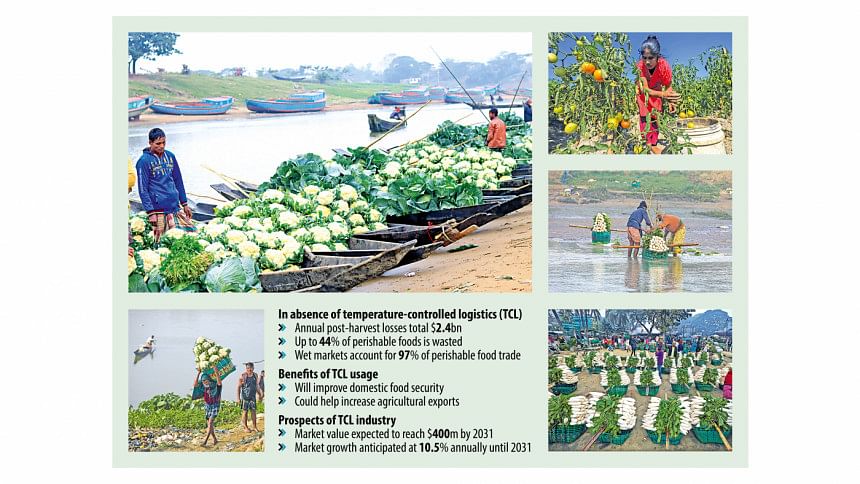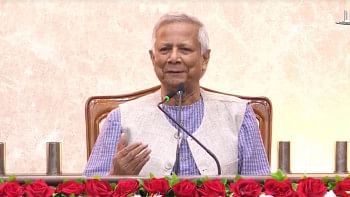Ensure cold chain logistics to reduce $2.4bn post-harvest losses

Bangladesh faces annual post-harvest losses of about $2.4 billion as the country lacks essential cold chain infrastructure and services known as temperature-controlled logistics (TCL), according to a paper presented at a conference.
William Fellows, managing director of Lixia Capsia Gestionis (LixCap), said up to 44 percent of all perishable food produced in the country is wasted each year in absence of TCL.
He made this comment while presenting a keynote on the 'Importance of TCL: Role of Cold Chain in Ensuring High Quality, Safe Food, and an Expanded Export Basket' at a Cold Chain Investment Conference 2024.
The conference was organised by Bangladesh Investment Development Authority (Bida) and Bangladesh Trade Facilitation Project (BTF) of the US Department of Agriculture at the Bida in Dhaka yesterday.
Fellows said he expects that TCL services, including storage, transportation and value-added services, will have a combined market value of about $400 million in the country by 2031.
As such, lucrative opportunities exist in financing and operating projects for developing cold chain facilities, which will in turn improve the handling, export and import of perishable goods.
Besides, ensuring growth and investment in the TCL industry would improve the livelihoods of farmers, help food producers meet certain requirements and create opportunities for export.
However, TCL systems in the country are predominantly emerging in urban areas like Dhaka and Chattogram, he added.
So, the increasing demand for cold chain facilities remains unfulfilled, with about 97 percent of all perishable food sales taking place in wet markets or other informal retail spaces lacking refrigerated storage and transport services.
Against this backdrop, Fellows suggested declaring the TCL industry as a priority sector to facilitate new investment, create jobs and directly boost export diversification by ensuring food quality and safety.
He also said local financial institutions should consider facilitating development-oriented funding options that will help achieve sustainable outcomes through the development of the TCL industry.
Salman F Rahman, the prime minister's adviser on private industry and investment, said food security is very important for Bangladesh, with agriculture being one of the pillars of the economy.
"For this reason, we are creating physical infrastructure, including port, road and rail networks," he said.
Rahman added that private sector investment in the TCL industry would play a vital role in diversifying the country's exports with perishable goods and food.
Md Selim Uddin, secretary to the fisheries and livestock ministry, said Bangladesh loses 10 to 40 percent of its agricultural products each year as such perishable items must be consumed quickly after harvesting in absence of TCL systems.
So, the TCL could play an important role in reducing post-harvest losses while also meeting certain needs of food producers and exporters, including cattle farms and fisheries, Uddin added.
Mostafa Azad Chowdhry Babu, president of Bangladesh Cold Storage Association, said there are around 550 cold storage units across the country that were established in 1960 to preserve potatoes.
"The investors had no idea about the need to preserve other agricultural products like onions, carrots and tomatoes," he added.
As such, ensuring cold storage facilities for other agricultural items would help reduce prices and imports during the off-season as local harvests would be preserved.
M Masrur Reaz, chief executive officer of Policy Exchange Bangladesh, said TCL systems are going to be very useful for export diversification in the future.
While informing that the TCL industry will be prioritised in the upcoming logistics policy, Reaz said agricultural products contribute just 1.54 percent of the country's current export basket.
"But the sector has huge potential as agricultural exports would definitely increase if the TCL industry is developed," he said.
To boost growth in the TCL industry, Reaz suggested forming public-private partnership in production areas and facilitating imports of cold chain equipment.
Sarah Gilleski, agriculture attaché at the US embassy in Dhaka, assured that they would provide additional financial support to develop the TCL industry as needed to meet the growing domestic demand.
Presiding over the programme, BIDA Executive Chairman Lokman Hossain Miah said investing in TCL systems would reduce post-harvest losses and import dependence, leading to stable prices for staple foods.

 For all latest news, follow The Daily Star's Google News channel.
For all latest news, follow The Daily Star's Google News channel. 



Comments